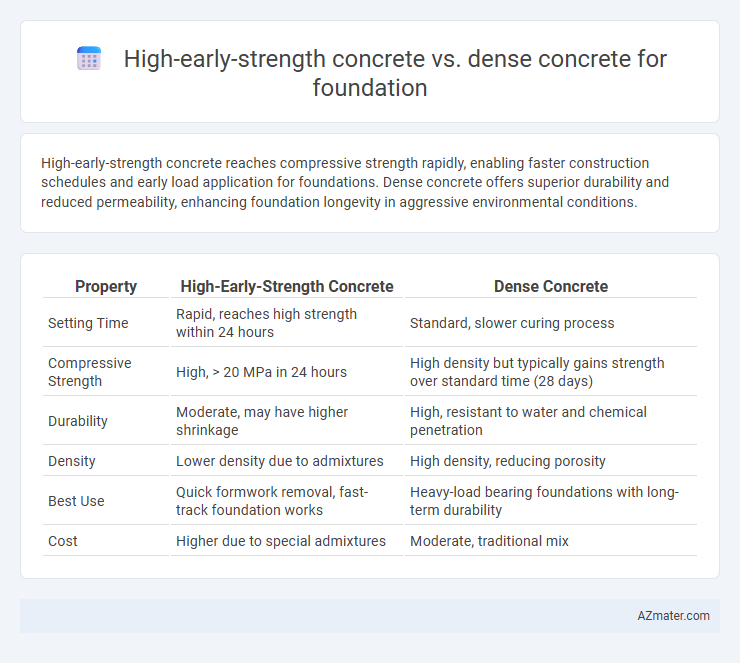High-early-strength concrete reaches compressive strength rapidly, enabling faster construction schedules and early load application for foundations. Dense concrete offers superior durability and reduced permeability, enhancing foundation longevity in aggressive environmental conditions.
Table of Comparison
| Property | High-Early-Strength Concrete | Dense Concrete |
|---|---|---|
| Setting Time | Rapid, reaches high strength within 24 hours | Standard, slower curing process |
| Compressive Strength | High, > 20 MPa in 24 hours | High density but typically gains strength over standard time (28 days) |
| Durability | Moderate, may have higher shrinkage | High, resistant to water and chemical penetration |
| Density | Lower density due to admixtures | High density, reducing porosity |
| Best Use | Quick formwork removal, fast-track foundation works | Heavy-load bearing foundations with long-term durability |
| Cost | Higher due to special admixtures | Moderate, traditional mix |
Introduction to Foundation Concrete Types
High-early-strength concrete achieves rapid strength gain within hours, making it ideal for fast-track foundation projects requiring quick load application. Dense concrete, characterized by low porosity and high compaction, offers superior durability and resistance to environmental factors, essential for long-lasting foundations in harsh conditions. Selecting between these concrete types depends on project timelines and exposure requirements, balancing early load capacity with long-term structural integrity.
What is High-Early-Strength Concrete?
High-early-strength concrete is a specially formulated mix designed to achieve rapid strength gain, reaching up to 70% of its compressive strength within the first 24 hours, making it ideal for fast-paced construction projects requiring early load bearing. This type of concrete typically contains higher cement content, finer particles, and accelerators such as calcium chloride or sulfoaluminate cement to enhance hydration and strength development. Compared to dense concrete, which emphasizes low permeability and long-term durability, high-early-strength concrete prioritizes quick structural stability and early formwork removal for foundations.
What is Dense Concrete?
Dense concrete is a type of concrete characterized by a low porosity and high compaction, resulting in minimal voids and enhanced durability, making it ideal for foundations exposed to heavy loads and aggressive environments. Its dense microstructure reduces water penetration and chemical ingress, thereby increasing resistance to freeze-thaw cycles and sulfate attacks. Compared to high-early-strength concrete, dense concrete emphasizes long-term strength development and structural integrity, providing a solid and lasting foundation.
Key Properties of High-Early-Strength Concrete
High-early-strength concrete achieves compressive strengths of 15 to 20 MPa within 24 hours, enabling faster construction schedules compared to dense concrete which typically gains strength more gradually. Its enhanced early hydration rate results in rapid setting and high initial durability, making it ideal for foundations requiring quick load-bearing capacity. The reduced curing time minimizes construction delays and improves resistance to early-age cracking, critical for structural stability in foundation work.
Key Properties of Dense Concrete
Dense concrete for foundations exhibits low porosity and high compressive strength, ensuring superior durability and resistance to water penetration compared to high-early-strength concrete. Its tightly packed aggregate matrix enhances load-bearing capacity and longevity by minimizing shrinkage and permeability. The increased density significantly improves freeze-thaw resistance and chemical durability, making it ideal for aggressive soil conditions and long-term structural stability.
Performance Comparison: High-Early-Strength vs Dense Concrete
High-early-strength concrete achieves compressive strengths above 20 MPa within 24 hours, enabling quicker formwork removal and faster construction schedules, which is critical for time-sensitive foundation projects. Dense concrete, characterized by low porosity and high durability, offers superior resistance to environmental degradation, including sulfate attack and freeze-thaw cycles, ensuring long-term structural integrity in foundations. While high-early-strength concrete excels in early load-bearing capacity, dense concrete provides enhanced durability and longevity, making the choice dependent on project timeline priorities versus exposure conditions.
Durability and Longevity in Foundation Applications
High-early-strength concrete achieves rapid curing, enabling quicker load bearing and reducing construction time, which is crucial for fast-paced projects but may exhibit increased shrinkage risk if not properly managed. Dense concrete offers superior durability due to its low porosity, enhancing resistance to water penetration, freeze-thaw cycles, and chemical attack, making it highly suitable for long-term foundation performance. For foundation applications requiring exceptional longevity and durability, dense concrete provides more reliable protection against environmental stressors, whereas high-early-strength concrete is favored for time-sensitive construction needs.
Cost Differences and Construction Timelines
High-early-strength concrete accelerates construction timelines by reaching required strength rapidly, reducing formwork duration and enabling earlier load application, which often leads to overall project cost savings despite higher initial material expenses. Dense concrete, characterized by low porosity and high durability, generally incurs lower material costs but extends curing times, potentially delaying subsequent construction phases and increasing labor costs. Choosing between the two depends on balancing upfront costs against schedule demands, with high-early-strength concrete preferred for fast-track projects and dense concrete suited for long-term durability in less time-sensitive foundations.
Suitability for Various Soil and Environmental Conditions
High-early-strength concrete accelerates construction timelines and provides rapid load-bearing capacity, making it ideal for projects requiring quick foundation support in challenging soil conditions such as soft clay or expansive soils. Dense concrete, characterized by low permeability and high durability, excels in harsh environmental conditions including areas prone to groundwater exposure, freeze-thaw cycles, or aggressive chemicals, enhancing foundation longevity. Selecting between these concretes depends on soil stability and environmental aggressiveness, balancing early strength needs against long-term durability requirements for optimal foundation performance.
Choosing the Right Concrete Type for Foundations
High-early-strength concrete accelerates the curing process, enabling faster construction schedules and earlier load application, making it ideal for projects with tight timelines or cold weather conditions. Dense concrete offers superior durability and resistance to water penetration, providing long-term structural integrity and protection against environmental damage when used in foundations. Selecting between high-early-strength and dense concrete depends on project requirements such as curing time, load-bearing needs, and exposure conditions for optimal foundation performance.

Infographic: High-early-strength concrete vs Dense concrete for Foundation
 azmater.com
azmater.com